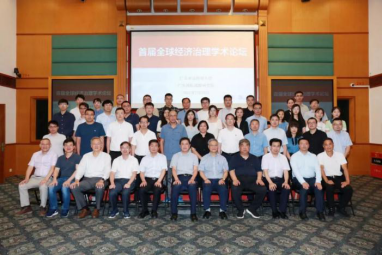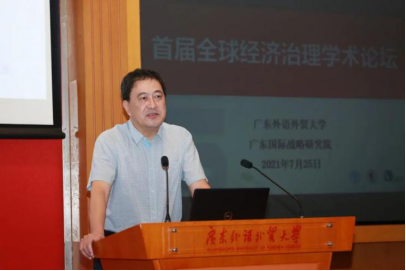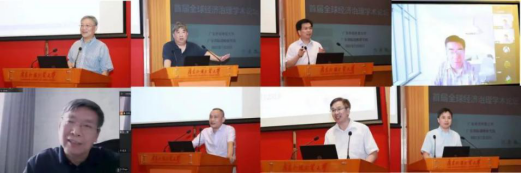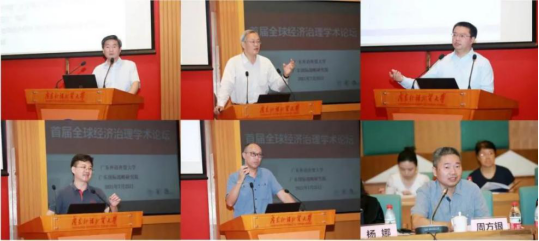The first Academic Forum on Global Economic Governance (2021) was held both online and offline by Guangdong Institute for International Strategy of Guangdong University of Foreign Studies (GDUFS) at Guangzhou on July 25 to carry out the spirit of the Fifth Plenary Session of the 19th CPC Central Committee, promote the development of global economic governance discipline and continuously complete the talent training system centering on the CPC Central Committee’s important statements and requirements about global economic governance. Representatives of experts and scholars from many universities, think tanks, offices of academic research and personnel offices within universities all over the country attended the conference, including Prof. Sui Guangjun, Party Secretary of GDUFS and Executive Vice President of Guangdong Institute for International Strategies; Zhang Yuyan, President of China Society of World Economics, Department Member of CASS and Director of Institute of World Economics and Politics of CASS; Prof. Lin Guijun, former Vice President of the University of International Business and Economics; Li Xiangyang, President of the National Institute of World Strategy of CASS; Prof. Wu Zhicheng, Vice President of the Institute of International strategy of the Party School of the CPC Central Committee; Distinguished Prof. Sheng Bin, Dean of the Economics School of Nankai University and Changjiang Scholar of Ministry of Education; Distinguished Prof. Li Xiao, Professor of Jilin University, President of Hengqin Smart Finance Research Institute and Changjiang Scholar of Ministry of Education.

Group Photo of The first Academic Forum on Global Economic Governance
The first Academic Forum on Global Economic Governance was themed by the discipline construction, talent training and academic research of global economic governance, divided into four parallel sessions with the aims of promoting the research, exchange and cooperation of global economic governance through high-quality academic seminars and providing a high-end academic communication platform about cutting-edge theoretical researches of global economic governance for relevant professionals at home and abroad. The opening ceremony of the forum was presided over by Prof. He Chuantian, Vice President of GDUFS.
Prof. Sui Guangjun, Party Secretary of GDUFS and Executive Vice President of Guangdong Institute for International Strategies, delivered in the speech that the spread of the global pandemic has exerted great influence on the world order. It was urgent to rethink China’s role in global governance. He expected that experts and scholars can discuss important issues about global economic governance profoundly and provide insights to improve China’s participation in the reform of the global economic governance system.

Prof. Sui Guangjun’s Speech
The first phase of the conference was presided over by Xu Xiujun, Director of International Political Science Office, Institute of World Economics and Politics of CASS.
Zhang Yuyan, President of China Society of World Economics, Department Member of CASS and Director of Institute of World Economics and Politics of CASS, made a speech on “Theoretical Thinking on Global Economic Governance” to build the theoretical framework of global economic governance through clarifying elements like assumptions, concepts, theories, phenomena, problems, propositions and values in researches, to explore incentive compatibility among various entities, use Lindahl equilibrium to achieve the balance of global governance as well as countries’ contribution and return in global public goods.
Prof. Lin Guijun, former Vice President of the University of International Business and Economics, proposed in his speech on “WTO National Security Reform: Suggestions for China” that the current concept of national security in the WTO is defined by the sovereign countries without strict discipline, leaving room for the protectionism. He suggested that we should solve national security issues through strategies including tariff reduction, accepting OECD national guidelines and “small yard, high fence”. Additionally, China should take a lead in conducting active dialogues with other member states to jointly support the restoration of the dispute settlement mechanism.
Prof. Wu Zhicheng, Vice President of the Institute of International strategy of the Party School of the CPC Central Committee, pointed out in his speech “Deeply Engage in Global Governance from China’s Perspective” that China is facing various challenges in terms of engaging in global governance, such as changes and turbulence unseen in a century, increasingly fierce strategic games between China and America, the growing anti-globalization trend. We should uphold the principle of extensive consultation, joint contribution, shared benefits and win-win outcomes, coordinate national and international governance based on our ability with a blend of delicacy and force.
Distinguished Prof. Sheng Bin, Dean of the Economics School of Nankai University and Changjiang Scholar of Ministry of Education, discussed the “Multilateral Trade Governance and WTO Reform”. He mentioned that WTO is confronting short-term problems (negotiation failure, ineffective enforcement of supervision rules and shutdown of appellate institutions) and long-term problems (lagging rules, insufficient attention to development differences and imperfect decision making mechanism and management system). He expected that member states could seize the opportunity at the 12th Ministerial Meeting to reach agreements on fisheries, vaccine intellectual property rights and e-commerce.
Prof. Zhang Erzhen from Business School of Nanjing University shared “Some Thoughts on Improving Global Economic Governance” from a perspective of different opinions of China and the US towards beneficiaries of globalization. It demonstrated developed countries’ failure in adapting to the changes in the global economic pattern, the new characteristics of international division of labor and the inclusive development of the global economy. He suggested that China needs to make active contributions to the theory of global economic governance, provide global public goods and set an good example for improving global governance.
Prof. Chen Weiguang from GDUFS, Senior Researcher of Guangdong Institute for International Strategy, made a speech on “Convergence or Separation: Discuss on the Trend of Global Economic Governance System Changes”, in which he analyzed two kinds of views on judging the evolution trend of global economic governance system based on the theory of separation and convergence. The speech reflected that a quasi-parallel system may be formed, in which China and America are separated from two different networks within regional agreements. He also suggested that China can response to this situation by slowing down the decoupling of science, technology and institutions, prudently promoting the internationalization of RMB and actively advancing deeper institutional opening-up.

Speeches by Experts and Scholars
Li Xiangyang, President of the National Institute of International Strategy of CASS, addressed on the “Path Selection of Belt and Road High Quality Development” and unfolded the fact that high quality development of Belt and Road in the post-pandemic era is challenged by the reshaping of the global value chains, “desinicization”, rivalry among major powers and differences that pandemic exerts on different types of national economies. He proposed to regard institutionalization as the guarantee for the sustainability of “Belt and Road”, and establish a regional value chain dominated by China.
Distinguished Prof. Li Xiao, Professor of Jilin University, President of Hengqin Smart Finance Research Institute and Changjiang Scholar of Ministry of Education, made an analysis on “Dilemma of Global Governance and Challenges that China Faces”, which pointed out that the division of global governance is mainly reflected in the ideological confrontation among major powers, the large gap between major powers’ domestic governance and global governance demands, and the division between the potential risks caused by the Federal Reserve’s monetary policy and the goal of global financial stability. At the same time, China is also faced with challenges such as the power containment of America, the relative neglect of coordinated consensus on values, and the absence of civil society in global governance.
Feng Weijiang,Deputy Director of the Institute of World Economic and Politics of CASS, made a speech on “Global Governance without All Member States: Competitive Prosperity is Impossible”. He analyzed the concept of positive security, security dilemma and negative security. He mentioned that no country can seek absolute security on its own, and the key to shape a community with a shared future is to adopt the idea of King Yu taming the flood, that is to say, we should transform the ability of provoking intentional security threats of other bodies into the ability to prevent and control common unintentional security threats.
Prof. Hu Jian, Director of the Soft Power Research Center of Shanghai Academy of Social Sciences, shared some views on “Study on the Relationship among the Global Economic Governance Bodies ”. He introduced the top ten paradoxes in global governance, including the contradiction between cosmopolitanism and nationalism, the contradiction between information technology advancing globalization and the narrow view of the nation’s interest, the technical barriers between countries with different ideologies and the unfairness of global economic governance system et al.
The researcher Xu Jin from the Institute of World Economics and Politics of CASS delivered a keynote speech entitled “Strategic Competition among Major Powers and Global Governance”, which analyzed the changes in the global governance and shifts of international order leadership from the perspective of international relationship. He pointed out that the ultimate goal of strategic competition among major powers is to construct an international order with itself at its core, thus the disputes about system and ideology between China and America will exist for a long time.

Speeches by Experts and Scholars
At the four parallel sessions of the forum held in the same period, experts, scholars, teachers and students from universities conducted hot academic discussion about global economic governance such as international economic and trade rules and order, digital economy and foreign investment.
Currently, the world is undergoing profound changes unseen in a century. The forum will adhere to the new positioning for China’s economic development and participation in global governance in the new era, conduct academic and policy researches in a deep-going way, and make important contributions to improving China’s active participation in global governance, advancing the reform of the global governance system, and driving the development of the global governance system toward a more just and reasonable direction.
